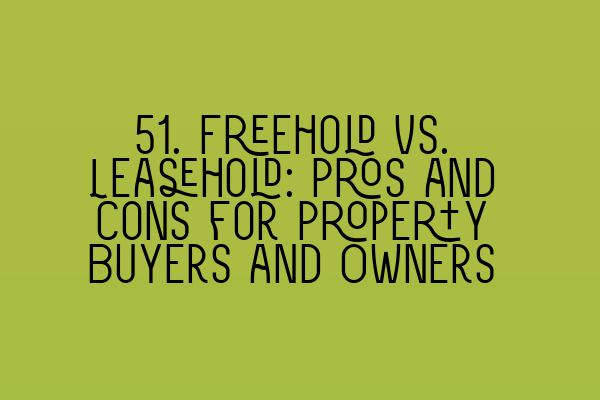Freehold vs. Leasehold: Pros and Cons for Property Buyers and Owners
When it comes to purchasing or owning a property, one of the key decisions to make is whether to opt for freehold or leasehold ownership. Both options have their own set of advantages and disadvantages, and it’s important for property buyers and owners to understand the differences between the two before making a decision. In this article, we will explore the pros and cons of freehold and leasehold ownership, helping you make an informed choice for your property investment.
Freehold
Freehold ownership means that you own the property and the land it sits on outright. This type of ownership gives you full control over the property, allowing you to make decisions and modifications without seeking permission from anyone else.
One of the main advantages of freehold ownership is the long-term security it provides. Since you own the property outright, you don’t have to worry about the lease running out or facing potential price increases when the lease is up for renewal.
Additionally, freehold ownership gives you the freedom to customize and personalize your property to your liking. You can extend, renovate, or modify the property without having to seek permission from a landlord or management company.
However, it’s worth noting that freehold properties often come with higher upfront costs compared to leasehold properties. The initial purchase price of a freehold property is typically higher than that of a leasehold property, so it’s important to consider your budget when making a decision.
Furthermore, as a freehold owner, you are solely responsible for the maintenance and repair of the property. This means that any associated costs for maintenance, such as roofing repairs or structural issues, will fall on your shoulders.
Related Article: SQE 1 Practice Exam Questions
Leasehold
In leasehold ownership, you own the property but not the land it stands on. Instead, you have a lease agreement with the freeholder or landlord, which grants you the right to occupy the property for a specified period of time.
One of the main advantages of leasehold ownership is that it often comes with a lower initial purchase price compared to freehold properties. This can be particularly attractive for property buyers working with a limited budget.
Leasehold ownership also means that certain responsibilities, such as building maintenance and communal area management, are typically undertaken by the freeholder or management company. This can provide a sense of convenience for property owners who don’t want to deal with these tasks themselves.
However, leasehold ownership also has its drawbacks. One of the key concerns is the lease length. Most leases have a finite term, typically ranging from 99 to 999 years. As the lease gets shorter, the value of the property may decrease, and it may become more challenging to sell in the future.
Leasehold owners may also be subject to ground rent and service charges. Ground rent is an annual payment made to the freeholder for occupying the land, while service charges cover the costs of maintaining communal areas and providing communal services. These ongoing financial obligations can add up over time, impacting the overall cost of owning a leasehold property.
Related Article: SQE 1 Practice Mocks FLK1 FLK2
Which Option Is Right for You?
Deciding between freehold and leasehold ownership depends on your individual circumstances and priorities. Here are a few factors to consider:
- Budget: If you have a limited budget and are looking for a more affordable option, a leasehold property may be the better choice.
- Long-term security: If you value long-term security and the freedom to make decisions without seeking permission, freehold ownership may be the best fit for you.
- Maintenance responsibilities: Consider whether you are willing to take on the responsibility of maintaining and repairing the property or if you would prefer these tasks to be handled by a management company.
- Lease length: If you opt for leasehold ownership, carefully review the lease length and consider the potential impact on the property’s value in the future.
Before making a decision, it’s crucial to seek professional advice from a solicitor who specializes in property law. They can guide you through the process, ensure you understand the implications of the ownership option you choose, and help you make the right decision for your specific circumstances.
Related Articles: SQE 2 Preparation Courses, SQE 1 Preparation Courses, SRA SQE Exam Dates
